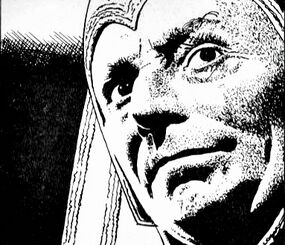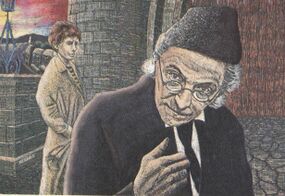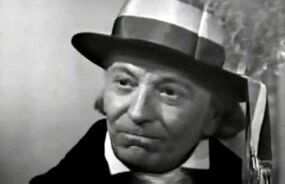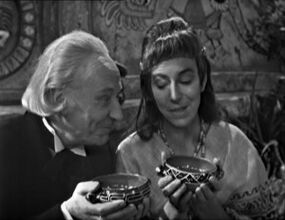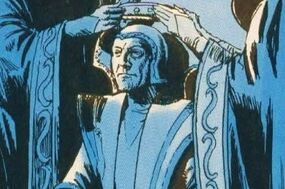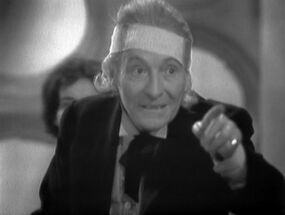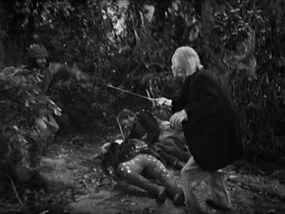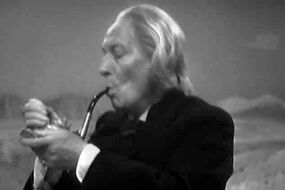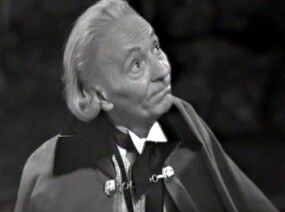First Doctor
The First Doctor was the first incarnation of the Time Lord, who became known as the Doctor.
Beginning on Earth in 1963, his travels through time space were mostly random owing to faulty components in his TARDIS. (PROSE: Time and Relative) Initially, he travelled with his granddaughter Susan Foreman, but was forced to abruptly depart 1963 with Susan's teachers Ian Chesterton and Barbara Wright, kidnapping them from their own time. After much travel with Ian and Barbara, he bade Susan farewell to allow her to live her live a happier life with a man with whom she had fallen in love. (TV: The Dalek Invasion of Earth)
Following Susan's departure, the Doctor travelled for a short time with Ian and Barbara, before happening upon the planet Dido a planet he knew from previous journeys and a new travelling companion; Vicki Pallister. She reminded him of Susan and the Doctor saw her as a surrogate to fill her spot in his travels with Ian and Barbara. Vicki left the Doctor's company, feeling her time with him was over and she needed to move on. (TV: The Rescue)
Later, during a confrontation with the Daleks, the Doctor used one of their time capsules to return Ian and Barbara to their proper time - something he had been unable to manage with his TARDIS. (TV: The Chase)
Soon after the departure of Ian and Barbara, the Doctor gained a new companion in Steven Taylor, with whom he had a relatively uneasy relationship. Steven soon became bitter towards him, blaming him for the several deaths of their travelling companions; Katarina and Sara Kingdom, but eventually forgave him. Companion Dodo Chaplet later joined them on their travels.
Ultimately, Dodo became injured in an adventure and decided to remain home in her own time, while Steven decided to stay to help a civilisation they had encountered.
Right before his battle with the Cybermen of Mondas, the Doctor had gained two new companions in Ben Jackson and Polly Wright, to whom he was much more kind; he hoped to prevent them from leaving as Steven had.
He met his end after battling the Cybermen for the first time on Earth. He was forced to regenerate into his second body from exhaustion and a loss of strength to maintain his ancient body.
Biography
Early life
Childhood
The Doctor was born on Gallifrey, home planet of the Time Lords. He was born under "the sign of crossed computers," the symbol of the maternity service there. (TV: The Creature from the Pit) The infant Doctor slept in his cot under "the Doctor's first stars" as Amy Pond pointed out. (TV: A Good Man Goes to War)
The Doctor had parents. (TV: The Sound of Drums) His mother may have been a Victorian Era human called Penelope Gate. (PROSE: The Gallifrey Chronicles) A later incarnation of the Doctor once claimed that he was half-human, (TV: Doctor Who) The Doctor lived in a house on the side of a mountain named Mount Cadon. (TV: The Time Monster) His home was called the House of Lungbarrow. He lived there along with his cousins, who were produced by the Looms, and with his brother, Irving Braxiatel. (PROSE: Lungbarrow, PROSE: Tears of the Oracle)
In his childhood, the Doctor once watched a meteor storm on Gallifrey with his father. (TV: Doctor Who) At the age of eight, the Doctor stared into the Untempered Schism as part of a Time Lord initiation rite. He reacted by running away. (TV: The Sound of Drums)
The Doctor and his friend the Master used to play in the estates of the Master's father. (TV: The End of Time) The Master would often hypnotise others, and the Doctor would un-hypnotise them. (PROSE: The Dark Path) The Doctor and the Master were bullied as children and the Doctor found himself forced to kill the bully Torvic to save his friend's life. He was later confronted by Death, who insisted he become her disciple. The Doctor refused and asked for Death to take away his guilt, causing her to transfer the memory of committing the crime to the Master instead. The Doctor forgot he had ever made the deal. (AUDIO: Master)
Academic career
As Romana later noted, the Doctor did not have an impressive career at school, passing his qualifying exams to become a Time Lord with only 51% - the lowest possible pass mark - on the second attempt. (TV: The Ribos Operation) He attended the Time Lord Academy under the tutelage of Borusa and was a member of the Prydonian Chapter. (TV: The Deadly Assassin) When he was ninety he visited the Medusa Cascade, later describing himself as "just a kid" then. (TV: The Stolen Earth)
At the Time Lord Academy, the Doctor belonged to a clique of ten young Time Lords with the collective name of the Deca, a group which included Koschei, later known as the Master, and Ushas, later known as the Rani. (PROSE: Divided Loyalties) The Doctor spent "centuries" at the Academy. (COMIC: Mortal Beloved) He was expelled for a time and relegated to traffic control for five centuries after his first encounter with the Celestial Toymaker in an act of youthful rebellion resulted in the 'deaths' of his friends Rallon and Millennia, but he returned to the Academy after receiving his doctorate in his spare time. (PROSE: Divided Loyalties)
Sometime later in his life, the Doctor was considered a 'superior' on Gallifrey. On one instance, he saved a glowing life form from being killed by other Gallifreyans, including his old friend Magnus. (DWMS: Flashback)
Before leaving Gallifrey, the Doctor learned of the existence of the miniscopes and was outraged by their cruelty to the specimens within. He campaigned to have them banned and, despite the non-interference policy of the Time Lords, was successful. His role in banning the use of miniscopes was known throughout nine galaxies. (TV: Carnival of Monsters, PROSE: The Empire of Glass)
Family life
At various times, the Doctor indicated that he had at one point had a family. (TV: The Tomb of the Cybermen)
The Doctor was a father at one point in his life (TV: Fear Her), of both "sons and daughters". (PROSE: The Eleventh Tiger) The Doctor had three known grandchildren, Susan, John and Gillian. (TV: An Unearthly Child, COMIC: The Klepton Parasites)
Leaving Gallifrey
The Doctor broke the Time Lords' law on non-interference and faced being erased from history by his brother Braxiatel. Braxiatel allowed the Doctor to run, giving him the chance to steal a Type 40 TARDIS and escape Gallifrey. He took with him the Hand of Omega and his granddaughter, Susan. (PROSE: Lungbarrow, AUDIO: Disassembled, PROSE: Legacy of the Daleks, COMIC: Time & Time Again) He grew a bond with this TARDIS that would last for centuries. When the Doctor first entered the TARDIS, he described it as "the most beautiful thing I ever saw". (TV: The Doctor's Wife)
Early Travels
Apparently, immediately after leaving Gallifrey, the Doctor rested in the TARDIS console room, while Susan explored the TARDIS. Where she found a full-length mirror, and saw a pale-skinned fanged figure who vanished after telling her that she is not the one. The Doctor theorised that, since they are now travelling through Time, she encountered a brief echo of another era, an event from either the future or the past. (PROSE: The Exiles)
On their journeys, the Doctor and Susan travelled to Bridgetown on the planet Quinnis in the fourth universe. They nearly lost the TARDIS when it was washed away during a severe flood. They recovered it with the assistance of a huntsman named Evalihi Parch IV, who possessed an ornithopter. (TV: The Edge of Destruction, AUDIO: Quinnis)
The first time the Doctor met humans on the planet Iwa. They were separated. In his search for Susan, the Doctor found a human medical colony. The principal work of the facility, called "the Refuge", was to rehabilitate patients identified as "Future Deviants". By undergoing dream therapy, it was hoped that such individuals would not become criminals. The Doctor soon learned the residents were besieged by fox-like aliens who could disintegrate and reconstitute their bodies. Taking him inside their compound, the humans stripped him of his clothes and burned them, citing possible contamination by the "foxes". They gave him new clothes drawn from their own supply. This meant that he was now wearing the garb of a doctor. When they assumed that he was sent by Earth to help them, he agreed. Not wishing to give them his real name, he referenced his new clothes to derive a title: "the Doctor". The Doctor assumed this alias, because he described it as an honourable profession amongst his own people.
He agreed to help them with their "fox problem" if they would help him find his granddaughter. They discovered "Susan" had become trapped in the colonists' "dream chambers", medical devices that put patients into deep sleep and linked them in one communal dream. Inside the dream chamber, the Doctor's granddaughter met a human colonist named Jill, who promptly gave the young girl the name "Susan", after Jill's own mother.
Eventually the newly-named Doctor and Susan were reunited. They helped the colonists broker an uneasy peace with the foxes. They left the colony, deciding to retain the names they had gained there. The Doctor was deeply impressed by humans during this initial encounter. He told Susan they should find a way to settle amongst them for a while, so that he could study them and they could maintain a low profile on the run from the Time Lords. (PROSE: Frayed)
Some time after this first meeting with humans, but before taking up residence at 76 Totter's Lane, Susan and the Doctor began to study Earth and humans more closely. The precise order of these events was unclear. Which included adventures where he met Henry VIII and visited the French Revolution, among other things.
One of their first trips to Earth was to the British coastal town of Keelmouth in 1933. There, they vacationed at a bed and breakfast called "Bide-a-Wee". Another of its guests was a time traveller named Prentice. He had used his technology to displace Keelmouth in time; the village was in 1933, but the surrounding world was in 1999. Prentice's aims were not precisely evil — he just wanted to retire in a place where it was always a small British village in 1933 — but the Doctor and Susan had to convince Prentice to reverse the effect, because his retirement fantasy wasn't fair to the people he had trapped alongside him. (PROSE: Bide-a-Wee)
The Doctor first met then-retired Brigadier, when he saved Susan from drowning in a boating accident near his house. (PROSE: The Gift)
The Doctor and Susan went to ancient Rome, Antioch, and Jerusalem. (PROSE: Byzantium!)
On 16 August 1979, the dematerialisation circuit was fried while the TARDIS was orbiting Earth. The TARDIS was taken on-board a Slarvian transport, and the duo learned that the snail-like species planned to conquer Earth by hatching their eggs all over the planet. Their plan failed because the Slarvian ship crashed into the English Channel, making the threat localised to England. With the help of the humans Linda Grainger and her grandfather Edward, the Doctor and Susan stopped the Slarvian eggs from hatching. (PROSE: Childhood Living)
Shortly before they settled on Totter's Lane, they unwittingly travelled to Paris in the 22nd century. They became embroiled in political intrigue in the run-up to an election in the city of Urrozdinee. Departing after the incumbent had been killed, they never quite understood that the city they had visited was what had once been known as EuroDisney. (DWY: Urrozdinee)
At this point, the Doctor had realised that "the TARDIS assaults the mind of anyone but its owner and his familiars." As a result, he and Susan have been losing their memory since they began travelling in the TARDIS. Therefore, this could prompt their search for somewhere to take residence and recover from the memory loss. (PROSE: Echoes of Future Past)
Living on Earth
Soon after this, they made a short trip to the planet Tacunda. There, they uncovered a jewel called a "Blessing Star". This crystal altered the laws of probability around the holder, essentially making their dreams come true. The Doctor tried the device, wishing that he could pilot the TARDIS to 20th century Earth. He was successful at piloting the ship for one of the only times in this incarnation's existence. Unfortunately, it completely fried the navigational system, stranding the Doctor and Susan in I.M. Foreman's junk yard in Totter's Lane, London. (PROSE: The Rag and Bone Man's Story) Several months before March 1963, the Doctor and Susan took up residence in London to allow Susan to complete her education, so the Doctor could effect repairs and build missing components for the TARDIS. (TV: An Unearthly Child, PROSE: Time and Relative) Meanwhile, findng a hiding place for the Hand of Omega. (TV: Remembrance of the Daleks, COMIC: Time & Time Again)
At an unknown point after his arrival in 1963, the Doctor had his first encounter with River Song, who would become his wife centuries later. He caught her sneaking around the junkyard where the TARDIS was located, but he was unaware of her identity. River ran off when she heard Susan, later writing in her diary that it was a conversation for which she was unprepared.(GAME: Doctor Who: The Eternity Clock)
Soon after the time of his arrival, a Dalek had discovered him. The Doctor's seventh incarnation also appeared in his past self's life on a mission from the White Guardian to steal the TARDIS Instruction Manual. Unbeknownst to the First Doctor, the Seventh Doctor saved him from the Dalek and made off with the instruction manual in the confusion. (COMIC: Time & Time Again)
At some point during 1963, he was placed on trial for murder as a result of killing a werewolf with a silver bullet. He was acquitted by the jury which was made up partly of his future selves, specifically his second, third, fifth and eighth incarnations. (PROSE: The Juror's Story)
Meeting Ian and Barbara
Whilst Susan attended Coal Hill School, the Doctor and she lived at 76 Totter's Lane. Two of Susan's teachers, Ian Chesterton and Barbara Wright, followed her home and confronted the Doctor. He launched the TARDIS, kidnapping them so they couldn't tell anyone about Susan and him. They travelled to what appearded to be the distant past.
The TARDIS experienced faults at this point in its chameleon circuit and its ability to indicate its space/time coordinates. Kidnapped by a tribesman named Kal, the Doctor was brought to the Tribe of Gum. Susan, Ian and Barbara followed to save him, but Za caught them and placed them all in the Cave of Skulls. The Doctor thanked Old Mother when she freed them, but grew miserable whilst trekking through the Forest of Fear. When Za was wounded by a tiger, the Doctor initially refused to help him. He picked up a rock and was seemingly ready to kill Za, until Ian stopped him. The Doctor claimed he was about going to have the injured man draw a map back to the TARDIS. (TV: An Unearthly Child) However, a meeting with his eighth incarnation in a time bubble - created when the two Doctors met - convinced him otherwise. (PROSE: The Eight Doctors) Recaptured and placed back in the cave, the Doctor tricked Kal into revealing he had killed the Old Mother. The Doctor helped Ian with an escape plan, and the travellers made it back to the TARDIS. (TV: An Unearthly Child)
Further adventures
Please help by adding some more information.
The Doctor was unable to return Ian and Barbara to their original place and time. When the TARDIS landed on Skaro, he lied about the fluid link needing mercury, when there was nothing wrong, so he could explore a nearby city. The Daleks imprisoned the Doctor and his companions inside the city, confiscating the fluid link they brought along.
Having escaped, they assisted the Thals in their attack on the Dalek city. The Daleks' power supply was damaged in the attack. The Daleks died and their plans to flood the atmosphere with radiation failed. (TV: The Daleks)
With the fluid link retrieved, the Doctor left Skaro for Earth, using the Fast Return Switch. The spring in the switch was damaged, causing it to be stuck. The TARDIS was sent to the beginning of a solar system and everyone was knocked out in the trip. The TARDIS tried warning the crew about the atoms forming around them when they came to, but the Doctor assumed that this was Ian and Barbara's sabotage of the ship. Once Barbara figured out what was going on, the Doctor fixed the spring, ending the fault. (TV: "The Rescue", The Edge of Destruction)
Still heavily damaged and malfunctioning, the TARDIS found its way to Earth, but did not make it to Ian and Barbara's time, instead landing in the Plain of Pamir in 1289. There, the Doctor met Marco Polo, who took the TARDIS and its keys on his caravan the breadth of Cathay to hand to Kublai Khan as part of a bargain for his return to Venice. Along the way, the Mongol warlord Tegana, also part of Polo's caravan, tried to take the TARDIS for Nogai as part of his plan to assassinate Kublai. In the chaos of Tegana and Polo's duel in Peking, the Doctor and his companions escaped in his repaired TARDIS. (TV: Marco Polo)
The Doctor landed on an island on Marinus. Arbitan asked them to search for the keys to the reprogrammed Conscience of Marinus to regain control over the Voord, as all of his other followers and family members failed to retrieve them. Arbitan trapped the TARDIS in a forcefield, preventing the Doctor and his companions' escape.
They used Arbitan's travel dials to reach Morphoton. Barbara released Arbitan's daughter, Sabetha, and the rest of the city from the Morpho's mind control, and retrieved the first key.
The Doctor jumped ahead to Millennius, the location of the final key, to find Eprin. Once Ian had found two more keys, he was knocked out and framed for Eprin's murder. The Doctor stood as defence at Ian's trial, but Ian was sentenced to death. The Doctor learnt that one of the conspirators in the murder, the prosector Eyesen, was ready to collect one of the keys and Ian was spared execution. The guards captured Eyesen and the last key was found in the mace that killed Eprin.
The Doctor and his companions returned to Arbitan's island, where Arbitan had been murdered. Ian handed the Voord a fake key, which destroyed the Conscience, along with the Voord. They were able to leave in the TARDIS once more. (TV: The Keys of Marinus)
The Doctor and his companions arrived in an Aztec temple in Mexico. They went through a one-way passage that prevented access to the TARDIS. Barbara posed as the Aztec god Yetaxa, with the others as her servants, to find a way back. Barbara tried and failed to change the Aztecs' history of human sacrifice for the better, which the Doctor strongly advised her against.
Susan was to be punished for denying marriage to the Perfect Victim of the Aztecs' sacrifice and Ian to be executed when he was framed by the High Priest of Sacrifice Tlotoxl for attacking the High Priest of Knowledge Autloc. Autloc's faith in Yetaxa was shattered, and he left for the wilderness. The Doctor, Ian and the Doctor's accidental fiancée Cameca distracted Ian and Susan's guard to escape. They worked on a pulley system to open the doorway back to the TARDIS. As they departed, the sacrifice of the Perfect Victim continued as planned. (TV: The Aztecs)
Leaving Susan Behind
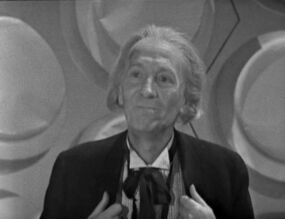
The Doctor and his companions also travelled into Earth's future; in London during the time of the 22nd century Dalek invasion, Susan met David Campbell, a young resistance fighter against the Daleks. Realising she would be better off not facing the dangers of travel, and recognising she was no longer a child, the Doctor reluctantly left her behind. (TV: The Dalek Invasion of Earth) Although he later reunited with her briefly for an adventure on Gallifrey, (TV: The Five Doctors) he continued to regret this decision for centuries to come (COMIC: The Forgotten) and even slept through a materialisation because of his sorrow. (TV: The Rescue)
Shortly after leaving Susan in the 22nd century, the Doctor travelled to Venus three billion years in the past to attend the funeral of the Doctor's old friend Dharkhig. There, the Doctor, Ian and Barbara became embroiled in the Venusians' conflict with their would-be saviors, the Sou(ou)shi. (PROSE:Venusian Lullaby)
The Doctor briefly lost Ian and Barbara as companions when they decided to settle down in 1950s Shoreditch, and he spent four months investigating the stone of Micah in 1950s, Scotland. Shortly after this, Ian and Barbare had found life in the 1950s difficult to adapt to and rejoined the Doctor aboard the TARDIS. (PROSE: Set in Stone)
Following this, the Doctor, Ian and Barbara spent an unknown amount of time travelling together.
Meeting New Companions
The Doctor gained a new companion in Vicki Pallister, who immediately became a surrogate for Susan. (TV: The Rescue) The Doctor and his companions continued to explore alien worlds and Earth's past. On one occasion they landed on Xeros, only to find their future selves exhibits in display cases. They began trying to avoid this version of the future. The Doctor was taken by the Moroks to be prepared for the exhibit but he was rescued by Ian. They were recaptured but the Xerons rebelled and freed them. Thus they prevented their own future. (TV: The Space Museum)
Following another encounter with the Daleks, the Doctor successfully programmed a Dalek time machine to take Ian and Barbara back home. At this time he gained another new companion in Steven Taylor. (TV: The Chase)
While his relationship with Vicki remained warm, the Doctor's relationship with Steven tended to be stressed at times. After Vicki's departure, a young woman from Troy named Katarina joined the Doctor and Steven. (TV: The Myth Makers)
Troubled Times Ahead
Soon after, the Doctor entered into an epic struggle against the Daleks that saw the deaths of two of his companions, Katarina and Space Agent Sara Kingdom. (TV: The Daleks' Master Plan) The uneasy relationship between the Doctor and Steven became more apparent from these events. So the Doctor tried to look for ways of rectifying it, such as visiting a rose garden, which lead to the Doctor's being taken by the Time scoop to the Death Zone. (PROSE: Roses, TV: The Five Doctors)
After the Daleks and Mavic Chen had been defeated, the TARDIS materialised in London in 1966. There they encounter the Fulgurites, who were involved in the trafficking of humans across the galaxy for slave labour with the full knowledge of the British government. The Doctor and Steven put an end to the Fulgurites' activities with the assistance of a young city trader named Oliver Harper, who joined the TARDIS crew. (AUDIO: The Perpetual Bond, The Cold Equations) Oliver travelled with the Doctor and Steven briefly. He met his death at the hands of the Vardans on the asteroid Grace Alone in the 23rd century while saving his companions' lives. (AUDIO: The First Wave)
This added additional strain to his relationship with Steven, who briefly left the TARDIS following a subsequent bloody adventure. (TV: The Massacre of St Bartholomew's Eve) Steven almost immediately returned however, and with new companion Dodo Chaplet, the Doctor continued their travels. Together they encountered humans from the far future, (TV: The Ark) the Celestial Toymaker, (TV: The Celestial Toymaker) famous characters from the American Wild West, (TV: The Gunfighters) and travelled to Kiev in the 13th century. (PROSE: Bunker Soldiers)
It was after this struggle with the Toymaker that the Doctor felt he was nearing the end of his first life, and became increasingly unwell. (PROSE: The Man in the Velvet Mask)
Steven eventually left the Doctor, albeit on better terms. (TV: The Savages) Soon after, the Doctor was forced to leave an injured Dodo on modern-day Earth, where he picked up the final companions of his first incarnation, Polly Wright and Ben Jackson. (TV: The War Machines) His travels eventually led him to Earth in the late 20th century and his first encounter with the Cybermen. (TV: The Tenth Planet)
Death
With his ancient body wearing thin, the increasingly frail Doctor matched wits with the Cybermen for the first time, an encounter which physically drained him. Hurrying back to the TARDIS he collapsed, having lost the energy needed to keep such an old body going. Before the astonished eyes of his companions, the Doctor regenerated for the first time, transforming into a new man. (TV: The Tenth Planet)
Undated adventures
- The Doctor camped out on Mars, but had to leave the camp material there when the TARDIS had a malfunction and almost left without him. (PROSE: Please Shut the Gate)
- The First Doctor visited Mondas. (PROSE: Byzantium!)
- The First Doctor attended the funeral of Alistair Gordon Lethbridge-Stewart. (PROSE: The Gift)
Alternate timeline
In an alternate timeline created by the Black Guardian as revenge on the Doctor, the First Doctor never left Gallifrey, and eventually became Lord President. However, it also left Earth to be invaded by countless aliens, who were then in war over the planet. The actual Seventh Doctor, Benny, and Ace, with instructions from the White Guardian, were able to retrieve the Key to Time to set the timeline straight. (COMIC: Time & Time Again)
Psychological Profile
Personality
The Doctor was adamant that he and Susan would one day return to Gallifrey. He saw himself as an exile, "without friends or protection", as he put it.
When he first met Ian and Barbara, he abducted them and set the TARDIS console to shock Ian into unconsciousness. He justified this by claiming he was keeping himself and Susan safe. He regarded humans as primitives and, arguably, even contemplated killing the mortally wounded Za so that he would not slow down the Doctor's party. When Ian caught him apparently ready to bludgeon the man with a rock, the Doctor explained he merely wanted Za to draw him a map. However, this explanation seemed somewhat improvised. Despite Ian's apparent hostility towards him, the Doctor was quick to bargain for his safety. (TV: An Unearthly Child)
The Doctor deliberately removed the TARDIS' fluid link so that he would have an excuse to explore the Dalek City on Skaro. He went so far as to offer the Daleks the secrets of the TARDIS in return for Susan's safety and took it upon himself to ensure the Thals were not threatened with extinction. (TV: The Daleks)
After the TARDIS became faulty, the Doctor took Ian and Barbara to be saboteurs and accused them as such. They refuted his claim but he insisted they were trying to blackmail him into returning them home. Barbara confronted him, saying "gratitude is the last thing you'll ever have or any sort of common sense either". When proven wrong, the Doctor apologised and spent some time trying to win Barbara over. (TV: The Edge of Destruction)
The Doctor refused to bend his knee to the Kublai Khan, giving rheumatic knees as his excuse. He seriously suggested that, faced with a bandit raid, he and his companions, along with Tegana, should leave in the TARDIS. (TV: Marco Polo)
On Marinus, he belatedly only agreed to help Arbitan restore the Conscience of Marinus after he was blackmailed. Despite earlier claims that he never gave advice, the Doctor took Sabetha aside and told her only man could preserve justice, and therefore could never be ruled by machines. (TV: The Keys of Marinus)
The Doctor came to the defence of established history when Barbara attempted to alter the nature of the Aztec civilisation. Nevertheless, he was not averse to having a personal relationship with one of its respected female elders. (TV: The Aztecs)
The Doctor would, when pressed, resort to hand-to-hand combat with an effectiveness which belied his age. (TV: The Romans, The Crusade, The Chase, The Daleks' Master Plan) A professional wrestler, the Mountain Mauler of Montana, had taught him some effective moves. (PROSE: Byzantium!, TV: The Romans)
At other times, however, the Doctor revealed age-related vulnerabilities. For example, he suffered from rheumatism that flared up if he was exposed to cold. (TV: The Space Museum)
The Doctor was quick to comfort Vicki when she expected him to abandon her. Despite his earlier lectures against altering history, he used first aid - including drugs - upon the injured de Tornebu. He proceeded to justify stealing clothes based on the fact they were already stolen and found his shoplifting abilities hilarious. Although he knew that it wouldn't work, the Doctor tried to convince King Richard to carry out his peace plan. (TV: The Crusade)
Together with Vicki, he admitted that he would miss Ian and Barbara after they had left. (TV: The Chase) He would get particularly snappish with those who doubted the TARDIS could actually travel through space and time. (TV: An Unearthly Child, The Time Meddler)
The Doctor was frequently sarcastic towards those around him, seemingly to elevate himself above lesser intellects. (TV: The Time Meddler, The Chase) He once stated his belief that there was a reason for everything in the universe and claimed to have "the directional instinct of a homing pigeon". (TV: The Chase)
When he met the Monk, the Doctor quickly labelled him a "time meddler" and continued to uphold his belief that history could not be changed. (TV: The Time Meddler)
The Doctor was quick to help the Rills in their fight against the Drahvins on a doomed planet, noting that bias based on appearance was unwelcome. He allowed the Drahvins to die when the planet exploded. (TV: Galaxy 4)
The Doctor did not associate himself with a specific culture. When a policeman asked if he was British, he replied:
I am a citizen of the universe, and a gentleman to boot!
He negotiated the release of the Monk from the Daleks, despite peace not being brokered between the two Time Lords, and could not explain his motives for having done so. (TV: The Daleks' Master Plan)
In 16th century Paris, the Doctor again backed up his previous ideal (TV: The Aztecs) that it was okay to save people who were not directly contributing to historical events. (TV: The Massacre of St Bartholomew's Eve)
Upon witnessing the persecution of the so-called "savages", the Doctor was quick to ally himself with them against the Elders. He defied their suggestions that progress was based on exploitation, branding it murder. Despite this, the Elders recognised him as a man of infinite wisdom. (TV: The Savages)
Several of his future incarnations had a noticeably profound respect for the first incarnation, so much so that they dared not question his judgment. The Time Lords used this to their advantage when the second and third incarnations were found to be incapable of working together. (TV: The Three Doctors)
In another meeting, the Doctor again showed his position of authority over his future selves by deducing the truth about Rassilon's gift of immortality before the others and taking action without their input or objections. (TV: The Five Doctors)
Habits and quirks
The First Doctor punctuated his speech with, "Hmmmm...?", exasperated sighs and snorts and the occasional mangled phrase or word. He would address young women as "child" and younger men as "my boy", or in Ian's case by his name. However, he found it difficult, or pretended to find it difficult, to remember Ian's surname. He later used Ian's surname frequently when addressing him. (TV: The Keys of Marinus) The TARDIS required expert piloting and guidance by the Doctor. Its systems often broke down, including the navigational systems. This, combined with the fact the TARDIS was designed for six pilots, (TV: Journey's End) would explain the difficulty the Doctor encountered in returning Ian and Barbara to their lives in 1963 London.
The Doctor never even hinted at the nature of his own origins, other than to state that he and the Monk originated on the same world and to hint that Susan and himself were exiles from the same place and time. (TV: An Unearthly Child)
Mysteries and discrepancies
- One account explains that the Doctor rescued Larna, a young Time Lady from the Doctor's own time, whom he later called Susan. (PROSE: Birth of a Renegade) Whilst another account states that the Doctor had gone back in time to the Dark Times of Gallifrey to pick up both the Other's granddaughter and the Hand of Omega from that time period. (PROSE: Lungbarrow) Statements made by his later incarnations following the Last Great Time War, however, seem to imply that he was once a father and a grandfather. (TV: The Empty Child, Fear Her, The Doctor's Daughter, Night Terrors)
- This incarnation of the Doctor seemed unfamiliar with the Daleks, and demonstrated eagerness to explore their homeworld Skaro. (TV: The Daleks) However, he revealed in his seventh incarnation that he had already, by this time, hidden away the Hand of Omega on 1963 Earth, as part of an ongoing plan to defeat them. (TV: Remembrance of the Daleks) (His hiding the Hand of Omega was never stated to be directly related to the Daleks, only that his seventh incarnation knew that was what the Daleks were after, but not that he had known as such to begin with.) In addition, the Eleventh Doctor revealed that as a child, he was fond of a children's story called The Emperor Dalek's New Clothes among others. (TV: Night Terrors)
- For some reason, the First Doctor attended the funeral of Alistair Gordon Lethbridge-Stewart, even though his encounter with him was erased from his memory. (PROSE: The Gift, TV: The Five Doctors)
Other matters
- This Doctor was one of only two incarnations ever known to smoke, (TV: An Unearthly Child) the other being the Eighth Doctor (although this only took place when the Doctor's mind and personality were briefly 'mixed up' with traits from his companion Fitz Kreiner). (PROSE: Halflife)
- When the Doctor, Vicki Pallister, Barbara Wright and Ian Chesterton were being chased by the Daleks through time, he claimed to have built the TARDIS. (TV: The Chase) On the face if it, this statement appears to be in contrast with later incarnations and Time Lord authorities who claimed that the TARDIS was "borrowed"/"stolen", (PROSE: The Gallifrey Chronicles, TV: Planet of the Dead) an account the TARDIS itself agreed with. (TV: The Doctor's Wife) It has also been suggested that the TARDIS was better described as having been "grown", rather than "built". (TV: Rise of the Cybermen, The Impossible Planet)
- Additionally, Susan had made the claim that she coined the acronym TARDIS, (TV: An Unearthly Child) implying that the Doctor may have been somehow involved with the development of the TARDIS. The eighth incarnation revealed that he had made various additions to the TARDIS to replace the need for a direct symbiotic link to control the TARDIS and thus make it harder for the Time Lords to find him, suggesting that, while the Doctor did not build the TARDIS from the beginning, he made significant alterations to it after it came into his possession. (PROSE: The Taking of Planet 5)
- The computer WOTAN referred to the Doctor as "Doctor Who". Exactly why the computer would do such is unknown. (TV: The War Machines)
- See separate article.
- The matter of this incarnation's age and how long this incarnation lived was unclear, although Susan once called him an adolescent by Time Lord standards; (AUDIO: Here There Be Monsters) shortly after his regeneration, his next incarnation stated that he was around 450 years old. (TV: The Tomb of the Cybermen)
- See separate article.
- At one point the Doctor had his photograph taken and was issued a library card, which was mistaken for psychic paper by his eleventh incarnation. (TV: The Vampires of Venice)
- Technically, this Doctor's first known encounter with the Cybermen took place on the Death Zone on Gallifrey, where he encountered a small group of them in the tower. (TV: The Five Doctors)
- One account states that the Doctor was loomed into the House of Lungbarrow, and that he was a genetic reincarnation of the Other. (PROSE: Lungbarrow)
Appearance
In his later life, the Doctor had shoulder length, greyish-white hair. He had piercing brown eyes. The Doctor affected a slightly eccentric Edwardian dress sense, wearing a frock coat and tartan trousers. Occasionally he wore an Astrakhan (TV: An Unearthly Child, The Tenth Planet) or a Panama hat. (TV: The Chase, The Daleks' Master Plan) He sometimes wore a cape. (TV: Planet of Giants, The War Machines). He also used a smoking pipe on at least one occasion. (TV: An Unearthly Child)
Like his fifth incarnation, he sometimes used half-moon reading glasses, (TV: The Time Meddler, The Daleks' Master Plan, The War Machines) although a later incarnation would call into question whether he actually needed them. (TV: Time Crash) He occasionally employed a walking stick (TV: The Five Doctors) made of ebony (PROSE: Nothing at the End of the Lane) which sometimes made an effective weapon. (TV: The Rescue, The Chase) He wore a blue signet ring which had special, if ill-defined, powers. (TV: The Web Planet, The Daleks' Master Plan, The Power of the Daleks) On one occasion, the ring appeared to both facilitate hypnotism and protect the Doctor from electrical shock. (TV: The War Machines) On one occasion, he did not wear his ring, and wore fingerless gloves on his hands. (TV: The Five Doctors)
When adventuring in Earth's past, this incarnation of the Doctor, in contrast with most that followed, sometimes made significant changes to his wardrobe in an attempt to blend in with the local population. (TV: The Romans, The Reign of Terror, The Crusade) He usually made at least a token alteration to his "standard" outfit wherever he went in Earth's past, as when he wore a cowboy hat in 19th century Arizona. (TV: The Gunfighters) More rarely, he would gladly accept the vestments of extraterrestrial societies, as when he proudly wore the ceremonial garb of the Elders. (TV: The Savages)
Behind the scenes
- According to The Brilliant Book 2011, a non-narrative based book, the First Doctor met Winston Churchill in 1911, stepping out of the TARDIS to tell Churchill it was an honour to meet him. When Churchill informed the Doctor they had met before, the Doctor chuckled and said, "That's the trouble with time travel".
Casting
Actors considered for the role of "Doctor Who", as he was then known, included Geoffrey Bayldon, Cyril Cusack, Hugh David and Alan Webb.[source needed] Leslie French was also considered for the role.[1] William Hartnell had, up until that point, mainly played small-time thugs and other unsympathetic parts in crime films and humourless military men in comedies. Producer Verity Lambert was inspired to ask him to accept the role after seeing him in his well-known role in This Sporting Life, which convinced her that he could play a tough, yet shaded and sympathetic character.
When the time came for the First Doctor to appear in the 1983 Children in Need anniversary special TV: The Five Doctors, actor Richard Hurndall was hired to play the role, standing in for William Hartnell, who had died in the mid-1970s. A clip of Hartnell as the Doctor from The Dalek Invasion of Earth preceded the opening titles, and Hartnell's name appeared amongst those of his fellow Doctors in the end credits.
Footnotes
- ↑ Silver Nemesis. Doctor Who Classic Episode Guide. BBC (2003).
| ||||||||||||||||||||||||||||||||||||
